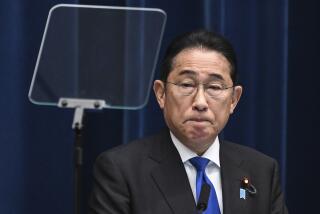Japanese Markets React Favorably to Likelihood of Hata Succession
TOKYO — Foreign Minister Tsutomu Hata’s emergence as the clear front-runner to be Japan’s next prime minister was welcomed Wednesday as boosting hope for economic recovery and for an easing of trade tensions with the United States.
Hata, a conservative former finance minister with extensive experience in government, is generally seen as a competent figure who would try to move forward with steps to stimulate Japan’s stagnant economy and make it more open to foreign imports.
Although Japan’s ruling coalition remained deadlocked Wednesday over plans to choose a successor to Prime Minister Morihiro Hosokawa, investors in the Tokyo stock market responded favorably to the political shift toward Hata. The 225-stock Nikkei index rose 412.08 points, or 2.1%, to close at 20,060.41. The dollar strengthened by 0.13 yen to close at 103.65.
“It’s the Hata effect,” Paul Summerville, director of Asian research at Lehman Bros. Japan Inc., said of the stock market’s sharp rise. “He is seen as someone who knows how to pull the levers of power.”
Hata’s momentum encouraged investors not only because of his personal qualifications, but also because a quick decision on any acceptable figure as the next prime minister reduces the risk of prolonged political uncertainty. One fear has been that political stalemate could lead to quick but inconclusive elections, delaying important economic policy-making for months.
Even as complex political maneuvering within Japan’s ruling coalition appeared to shift decisively in Hata’s favor, he flew out of Tokyo on Wednesday for Marrakesh, Morocco, where ministers from more than 120 countries are gathering to sign a landmark international trade accord under the General Agreement on Tariffs and Trade, confirming the Uruguay Round agreement reached in December.
Hata is scheduled to meet Thursday in Marrakesh with Vice President Al Gore and Friday with U.S. Trade Representative Mickey Kantor. Hata’s aim is to restart the U.S.-Japan “framework” trade talks that broke down at the February summit in Washington between Hosokawa and President Clinton.
Kantor told reporters in Marrakesh on Tuesday that “the ball is in their court” for Japan to come up with proposals on how to make progress on trade issues.
The current political upheaval was prompted by Hosokawa’s sudden announcement Friday of his intent to resign. If the ruling coalition settles quickly on Hata as the next prime minister, his election by the lower house of Parliament could come early next week.
More to Read
Inside the business of entertainment
The Wide Shot brings you news, analysis and insights on everything from streaming wars to production — and what it all means for the future.
You may occasionally receive promotional content from the Los Angeles Times.










